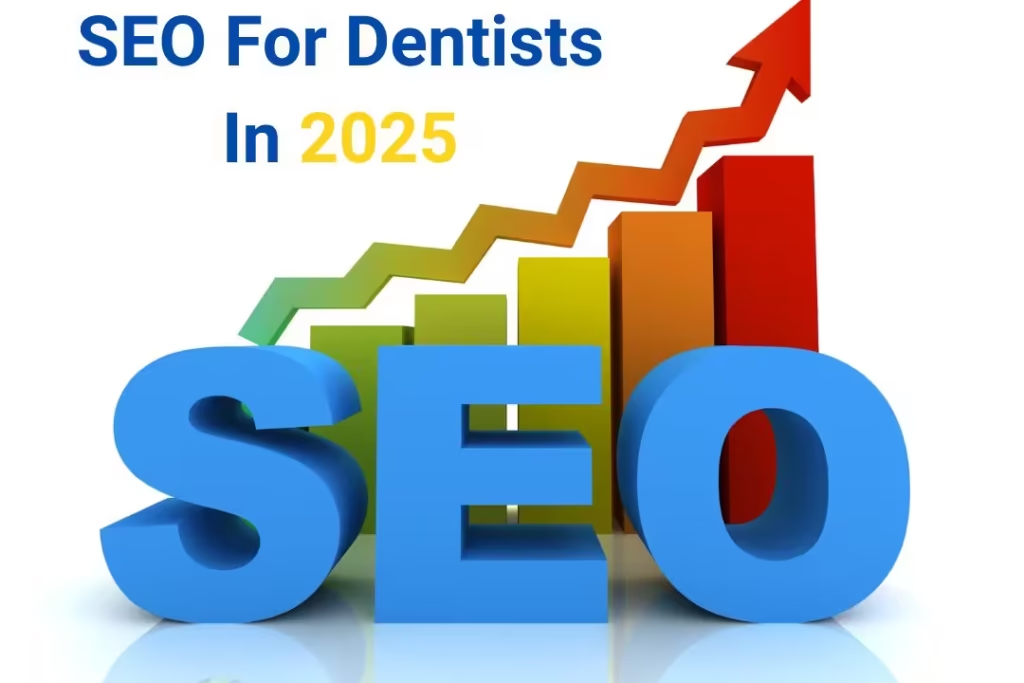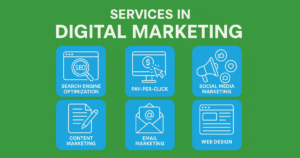If you are a seasoned professional dentist or just starting your practice, attracting new patients is crucial in maintaining a thriving dental business. You may have heard the term “SEO For Dentists.”
Or, you might be curious about “How Do Dentists Find Clients?”
With the rise of digital marketing and increasing competition, dentists are turning to SEO strategies, social media marketing, and local SEO to connect with potential clients.
Now, you may be thinking, “Do Dentists Need SEO?”
Dentists need SEO to improve their online visibility and attract more patients. An effective SEO strategy ensures their practice ranks higher on search engines, making finding them more accessible for potential clients.
In a competitive industry, SEO is essential for long-term growth and success. Increasing your search engine rankings doesn’t have to be complex or require hiring an SEO agency.
Even beginners can significantly boost their online presence by leveraging straightforward and effective dental SEO techniques with our guidelines at Seo Service Care.
This article will help you understand dental SEO and how to optimize your practice’s visibility. This process can be manageable and rewarding with expert guidance and tried-and-tested strategies. Let’s dive in.
What is Dental SEO? Why does Local SEO for Dentists matter?
Dental SEO is optimizing a dental practice’s online presence to improve its visibility on search engines like Google. It focuses on strategies such as keyword optimization, quality content creation, and technical improvements to attract potential patients searching for dental services online.
By targeting terms like “dentist near me” or “teeth cleaning in California” or any city where your business is located, dental SEO helps practices effectively reach their local audience.
Local SEO for dentists is crucial because most patients search for dental services in their immediate area.
Local SEO strategies, such as optimizing Google Business Profiles, gathering patient reviews, and incorporating location-specific keywords, ensure that practice appears in local search results and map listings.
This increased visibility drives more foot traffic, builds trust and ultimately converts online users into loyal patients. With strong local SEO, dental practices can avoid being overshadowed by competitors, even in their community.
7 Reasons Why SEO Is Important for Dentists
SEO is vital for dentists to grow their practice, attract new patients, and retain existing ones. With over 77% of patients using online searches to find healthcare providers, implementing an effective SEO strategy can be a game-changer for dental professionals.
Below, we outline seven key reasons why SEO is essential for dentists, supported by data and analysis.
1. Increases Visibility in Local Search Results
Dentistry is inherently local—most patients look for practices within their vicinity. Local SEO helps dental practices appear in “near me” searches, which account for nearly 46% of Google searches.
Why It Matters:
Google My Business (GMB) Optimization: Claiming and optimizing your GMB profile boosts your chance of appearing in the local “3-pack,” which receives 75% of local search clicks.
According to BrightLocal, 78% of local mobile searches result in an offline purchase—or, in this case, an appointment.
Pro Tips: Incorporate location-specific keywords like “dentist in [your city]” or “emergency dental care near me.”
2. Builds Trust and Credibility
Patients often associate top search rankings with trustworthiness. A study shows that 81% of people trust online search engines to deliver accurate information.
Dentists can establish credibility by ranking high on search engine results pages (SERPs).
Why It Matters:
Patients are 70% more likely to choose a provider listed on the first page of Google than one on the second page. Positive reviews, schema markup, and professional website content further enhance authority.
Pro Tips: Encourage satisfied patients to leave Google reviews and include structured data highlighting services, hours, and contact information.
3. Drives Targeted Traffic to Your Website
Unlike traditional advertising, SEO brings in traffic actively searching for your services. For example, someone searching for “teeth whitening near me” is likely ready to book an appointment.
Why It Matters:
Websites with optimized content receive 53% of all organic traffic.
Dental websites ranking on the first page of Google get an average 34% click-through rate (CTR) compared to less than 2% for the second page.
Pro Tips: Create content targeting high-intent keywords such as “cosmetic dentistry” or “emergency dental services.”
4. Cost-Effective Marketing
Compared to paid ads, SEO provides a better long-term return on investment (ROI).
While Pay-Per-Click (PPC) campaigns require continuous spending, SEO delivers results for months or even years after the initial investment.
Why It Matters:
HubSpot reports that 75% of marketers believe SEO is more effective than PPC in the long run.
Dental practices can save thousands of dollars annually by reducing their dependence on paid advertising.
Pro tips: Combine SEO with content marketing to create a sustainable lead-generation strategy.
5. Enhances User Experience (UX)
SEO isn’t just about keywords; it also focuses on website speed, mobile responsiveness, and ease of navigation—all of which improve user experience. A smooth UX ensures that visitors stay longer and are more likely to convert.
Why it matters:
53% of mobile users abandon a site that takes longer than 3 seconds to load. Websites with a good UX have a 200% higher conversion rate than poorly optimized sites.
Pro Tips: Ensure your website is mobile-friendly, loads quickly, and provides clear calls to action (CTAs) like “Schedule an Appointment.”
6. Competes Effectively with Larger Practices
SEO levels the playing field, allowing small or solo dental practices to compete with larger chains. A well-optimized website targeting niche services can outrank competitors with bigger budgets.
Why it matters:
A small practice specializing in “pediatric dentistry” can dominate local SERPs by targeting specific keywords and optimizing its GMB profile, even against large dental chains.
Pro Tips: Focus on niche keywords like “family dentist in [city]” or “dentist for kids near me.”
7. Tracks and Measures Performance
SEO provides measurable results. With tools like Google Analytics and Search Console, dentists can monitor key metrics such as website traffic, conversion rates, and keyword rankings.
Why It Matters:
Data from Moz shows that SEO drives 20X more traffic than PPC for long-term strategies. Performance metrics allow practices to adjust strategy and optimize for better results.
Pro Tips: Track metrics like bounce rate, organic traffic, and patient inquiries to refine your SEO strategy continuously.
You may be thinking “How to rank my dental practice locally?”
In this part of the article, you will learn how to optimize your business for local SEO and better results.
7 Steps to Optimize Your Local SEO for a Dental Practice
Local SEO is important for dental clinics to attract nearby patients looking for dental care.
By enhancing your online presence, you may improve your visibility in local search results and increase traffic to your clinic. Here are seven actionable steps to optimize your local SEO for a dental practice:
1. Create or Claim and Optimize Your Google Business Profile
Google Business Profile (GBP) is the cornerstone of local SEO.
- Create or Claim your profile if you still need to do so.
- Optimize your details: Add your practice name, address, phone number (NAP), website, office hours, and appointment links.
- Categories and Services: Dental services offered include teeth whitening, orthodontics, and emergency dental care.
- Images: Upload high-quality photos of your office, staff, and patient testimonials.
- Encourage reviews: Positive feedback might help you boost your rankings and gain trust.
2. Build Consistent NAP Citations
Accuracy in your Name, Address, and Phone Number (NAP) matters most across all platforms on the internet.
- List your practice on dental directories such as Healthgrades, Zocdoc, and local directories.
- Ensure your NAP information matches your GBP and website.
3. Optimize Your Website for Local Keywords
Your website must target local dental-related keywords to rank higher in search results.
- Use keywords like “dentist near me,” “California dental clinic,” or “affordable teeth cleaning in [your city]” in your content.
- Create dedicated pages for specific services and include local terms (e.g., “Emergency Dentist in Chino, CA”).
- Add an FAQ section targeting commonly searched dental questions.
4. Create Location-Based Content
Engage potential patients with localized content that addresses their needs.
- Write blog posts on topics like “Top Dentists in Phoenix,” “How to Choose a Family Dentist in Austin,” or “Dental Care Tips for Residents in Tucson.” Just input the location of your business.
- Highlight local partnerships or events, such as sponsoring school programs or participating in community health fairs.
5. Leverage Online Reviews and Reputation Management
Online reviews influence local search rankings and patient decisions.
- Request reviews from happy patients after appointments.
- Show that you appreciate comments by quickly responding to reviews, both favorable and bad.
- Use review platforms like Google, Yelp, and Facebook to strengthen your online reputation.
6. Optimize for Mobile and Voice Search
Voice assistants or mobile devices are used for the majority of local searches.
- Ensure your website is mobile-friendly: fast loading, easy navigation, and readable text.
- Optimize for voice search by including long-tail keywords and conversational phrases like “What is the best dentist near me?”
7. Building Local Citations and Backlinks
Search engines are informed that your practice is a reputable and authentic local business via local citations and backlinks.
Citations
Ensure your practice’s NAP details are consistent across directories like:
- Yelp
- Bing
- Mapquest
- Foursquare
- Yellow Pages
- Healthgrades
- Zocdoc
- Local Chamber of Commerce sites
Backlinks
Partner with local businesses or organizations to earn quality backlinks. For example:
- Sponsor community events.
- Write guest blogs for health-related websites.
How Much Does Dental SEO Cost?
The cost of dental SEO can vary widely depending on the scope of the services, your location, and the expertise of the SEO agency.
On average, monthly fees for dental SEO services range from $500 to $5,000 or more.
Small practices with basic needs might opt for lower-tier packages, while larger dental offices aiming for aggressive growth may invest in premium plans.
Factors like keyword research, content creation, link building, and local SEO optimization all influence the pricing.
Keep in mind that investing in dental SEO is a long-term strategy to improve online visibility, attract new patients, and increase revenue.
Choosing a provider with a proven track record and industry expertise is essential to ensuring a solid return on investment. Always compare services and reviews before committing to a plan. Get a free consultation for your business in our SEO Service Care.
Get Started With SEO for Your Dental Practice
Local SEO isn’t just a marketing tool—it’s a pathway to sustainable growth for your dental practice. By focusing on Google Business Profile, website optimization, reviews, and local keywords, you can ensure your practice stands out in your community.
Ready to boost your online visibility and attract more patients? Start implementing these strategies today, or partner with an experienced local SEO agency such as Seo Service Care to maximize results.
Some Common Questions for SEO for Dentists
Is it mandatory to do SEO?
SEO (Search Engine Optimization) is not mandatory, but it is highly beneficial for businesses, including dental practices, to improve their online visibility.
Without SEO, potential patients may struggle to find your website when searching for services you offer.
SEO helps rank your website higher on search engines, attract organic traffic, and build trust and credibility. In the competitive dental industry, not investing in SEO could mean losing patients to competitors who are more visible online.
How Do Dentists Market Themselves?
Dentists use various strategies to market themselves effectively:
SEO & Local SEO: Optimize websites to rank for terms like “dentist near me” or “emergency dental care.”
Social Media Marketing: Engage with the community on platforms like Instagram and Facebook by sharing educational posts, success stories, and promotions.
Google Ads and Facebook Ads: Attract new patients through paid campaigns targeting specific services.
Email Marketing: Send appointment reminders, dental care tips, and special offers to existing and potential patients.
Online Reviews: Encourage satisfied patients to leave positive reviews on Google, Yelp, and other platforms to build credibility.
Community Engagement: Sponsor local events or offer free dental check-ups to build goodwill.
What Do Dental SEO Services Include?
Dental SEO services typically include the following:
Website Optimization: Improve site speed, mobile-friendliness, and user experience.
Keyword Research: Identify keywords patients use to find dental services (e.g., “dental implants Chino”).
On-Page SEO: Optimize titles, meta descriptions, headers, and content for target keywords.
Local SEO: Claim and optimize Google Business Profile, manage online reviews, and build citations.
Content Marketing: Create blogs, videos, and other educational content to attract and engage patients.
Backlink Building: Acquire quality links from authoritative sources.
Analytics and Reporting: Monitor website performance and adjust strategies accordingly.
How Do I Hire a Dental SEO Service Provider?
Follow these steps to hire the right dental SEO service provider:
Research Agencies: Look for agencies specializing in dental SEO.
Check Experience: Ensure the provider has experience working with dental practices and understands the industry.
Review Portfolio: Ask for case studies or examples of past clients to gauge their success.
Understand Services: Confirm what is included—local SEO, content creation, backlink building, etc.
Request a Strategy Plan: A good provider will create a tailored SEO plan for your practice.
Assess Communication: Choose a provider with clear communication and regular reporting.
Read Reviews: Check testimonials or third-party reviews for credibility.
Set a Budget: Ensure the service fits within your marketing budget while offering measurable results.
Investing in professional dental SEO services is a long-term strategy to grow your practice and attract more patients. You can contact Seo Service Care to discuss your goals and expected results.
Why Are Backlinks Important for Dental SEO?
Backlinks are a critical factor for dental SEO because they:
Boost Search Rankings: High-quality backlinks from trusted websites signal to search engines that your website is credible.
Increase Website Traffic: Backlinks from relevant sites can drive referral traffic directly to your website.
Build Authority: A strong backlink profile establishes your practice as a leader in dental care.
Enhance Local SEO: Backlinks from local directories or businesses improve visibility in local search results.
To benefit, focus on earning backlinks from authoritative sources like health blogs, dental associations, and local community websites.
Does Google Ads Work for Dentists?
Yes, Google Ads works effectively for dentists. Google Ads allows dental practices to target specific keywords such as “dentist near me” or “teeth whitening services,” ensuring your ad appears when potential patients search for those terms.
It’s a pay-per-click model, meaning you only pay when someone clicks on your ad. Google Ads delivers quick results, is location-targeted, and helps attract patients ready to book appointments. Combining Google Ads with SEO can maximize your online presence.
Do Facebook Ads Work for Dentists?
Absolutely! Facebook Ads are powerful for dentists. With advanced audience targeting options, Facebook Ads allow you to reach local demographics such as age, location, interests, and even income levels.
For example, a dentist can advertise teeth cleaning specials or cosmetic dentistry services directly to users in their area. Facebook Ads also support visual storytelling, helping to promote services through before-and-after photos or video testimonials, which can build trust and generate leads.









